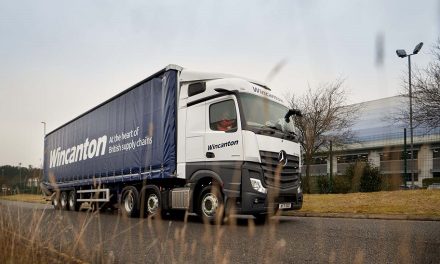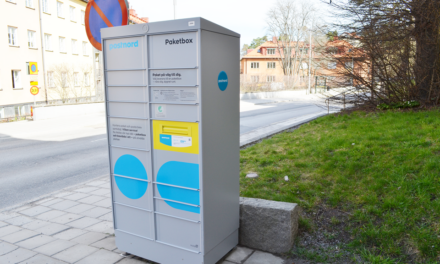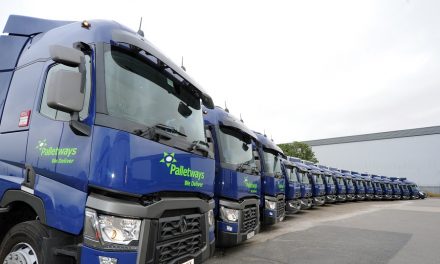
Closer to home: Company networking
Palletways managing director Jutian Maturi says that the network is growing with 80 members at present, 10 of which were taken on in the last month. He says: “The more links in the chain the stronger it is. The market place is moving towards smaller quantities and to do that you need specialists.”
Mr Maturi says that although national companies have national coverage, they don’t have local specialism to rival that of the regional companies. Palletways manages the regional members so that they can continue to perform in the areas they know, for themselves and other members. Pallets for delivery outside their region are dealt with by other members who likewise use their local knowledge to make deliveries.
“The best person to deliver to a person in Liverpool is a person from Liverpool. They’ll know the network, the road structure, when it’s busy and different holidays.”
He gives the example of a delivery made to Scotland where the destination point is closed because it is a Scottish holiday which does not affect the rest of the UK. Someone who lived there would have known this type of information, saving the time and money of a wasted delivery.
Some private companies have been concerned over a loss of identity and control when joining a network, but Palletways aims to include members in decisions on how their companies are run while controlling the growth and
integrity of the network, says Mr Maturi. Palletways discusses with members what both sides feel are attainable targets. If members are unable to meet expectations or wish to grow at a different level to that being asked of them, Palletways’ reduces the distribution area and looks for another member to fulfil expected increases.
REDUCED MILEAGE
Mr Maturi says: “By reducing the area and keeping the volume the same we are reducing their operational expenses because they don’t have to travel as far. We’re not cutting the amount of volume they get, so they have more opportunity to get more on the bottom line.”
Nick Verralt’s company Shakespeare has been a member of Palletways for five years, and he is clear about the business issues involved in being a member of a network. He says: “Every company belonging to a network must be prepared to work for the common good of that system and its other members.
There is some loss of control and identity associated with membership, and this has to be understood and accepted. In addition, there are tasks which must be performed at specified times and intervals irrespective of what problems the member company may have experienced during the day.”
Mr Verrall says that being part of the network means he does not have to worry about the final destination of consignments as he continues to work in his specified area, with everything trunked to the hub at Lichfield.
“The IT system routes the consignment and every single postcode in the UK has a local delivery member allocated to it. The consignments from other members then provide the return work and revenue for the trunks and the local vehicles that will make those deliveries before collecting new consignments from our own customers.”
A PERSONAL TOUCH
One of the main benefits of regional and independent distribution companies, repeated over and over again, is the idea of maintaining a personal touch, and being able to access decision makers easily. Mr Verrall says: “Most people in small companies develop their roles without the need for moving on, allowing the staff of both the customer and the supplier to build long-term relationships.”
Andy Meek, managing director of Meek Distribution, agrees that the benefits of running an independent/regional company are being able “to make quick decisions with short lines of communication, quick responses to problems, and owner/director involvement in day-today activities.”
He says the main problem, of “how to be in all corners of Britain at l0am every day”, is solved by using the network which runs full trunk loads at night both ways.
“We are a founder member of Palletways having recognised that our days were numbered if we could not get ourselves into the position of being able to say yes to all our customers’ requests. Customers no longer had the time (or inclination) to ring round the local hauliers to see who was going where the following day. Using local members means local knowledge, which means more efficient use of fuel.”
STRAIGHT TALK
Seafield Logistics managing director Paul Graham says the size of a company does not determine its problems.
“Large, medium or small all have individual problems, there’s margins, driver shortages, fuel costs, key skills shortages, EU harmonisation, potential economic slowdown — it all goes into the mix, but I think sometimes the major problem for smaller operators is as fundamental as reliability and trust. You just can’t beat straight talk and an honest-to-goodness value-for-money service.”
He says that large companies lose sight of the intricacies of one-to-one business.
“By helping our clients get what they want, they in turn will help us get what we want — prosperity, security and consistently in all our alliances. We concentrate on our core competence, streamline our costs and keep technology and communications at the forefront of our business.
“We do optimise inventories and
operate shared user distnbution. We have electronic warehouse management systems and deliver when needed. From inbound movement of raw materials, order assembly, contract packing and storage, to delivery of finished products.”
Mr Graham says that customers are looking for shorter more flexible contracts and that Seafield has recently joined a network to have more opportunity to offer these services. Seafield is a member of newly formed network PaIIetFORCE which is owned by its members for pallet and part load systems. The company went live on 31 August 2001 with 40 member shareholders, holding 54 depots between them.
This resembles the set-up of network Palletline which was established in 1992. Palletline has close to 50 members all owning a share in the company.
The Palletline network recently extended into Spain, (October 2001) giving members a link to Barcelona based Framptons Iberica, part of Framptons Transport Services in Somerset.
This share ownership provides “an opportunity for transport operators to come in at the beginning of something new and participate in an organisation where they can control their own destiny”, according to PaIIetFORCE chief executive Mick Scarlett.
Mr Maturi from Palletways’ disagrees saying their company is: “More flexible and can react to the future a lot quicker because we don’t have shareholders sat on the board who
have an invested interest.” There are other associations available
which represent hauliers’ interests such as The Transport Association, a network of 60 regional hauliers in the UK. Between the hauliers, they run 4,000 vehicles and operate from 150 sites nationally. It was originally founded as a self-help group to deal with operational issues including fuel, overnight parking, breakdowns and vehicle repairs. Chairman Stuart Cornthwaite says:
“Regional hauliers know how to manage their fleets efficiently, have a close relationship with their customers and there is someone to deal with any query immediately. Customers know that additional resource needed to manage peak demand can be met through this developing longstanding relationships with suppliers such as ERF and Gray & Adams.”
Mr Mourant says one of the benefits of dealing with a private company is that customers have contact with decision makers who can move quickly, “particularly in the case of setting up a service for a new customer which might require investment in new equipment.”
IDENTIFIABLE PEOPLE
JDF Logistics also believes that accessible information is key to success with short lines of communication and identifiable people to talk to if things go wrong.
Although not a member of a pallet network, JDF has its own national shared user distribution partnership consisting of four companies which provide timed bookings to retail, wholesale, and cash and carry outlets.
The company says that the key advantage is personal attention to detail and a hands-on dedicated service; run by people who have been in the industry for a long time. They also emphasised the importance of having an intimate knowledge of the region and customer contacts built up over a long period. They said regionally based staff did not tend to move around much.
JDF commented on changes due to take place with drivers’ hours and the Working Time Directive forecasting that companies will move back to regional bases to reduce costs. JDF says regional companies will stay competitive by sharing deliveries with other companies to reduce mileage and lower operational cost.
Pauline Edwards of Pauline Edwards Transport, says it has yet to join a network as a member, but still used their services.
“A lot of our customers do require the
service, but at this stage mainly just the odd pallets, which we feed in to two different pallet networks. I am sure there will be a time in the very near future when we have a large contract that will be distributed from our warehouse. That will be the only push I will need, hopefully I will not be to late.
“Our main concern has been for running a truck into a pallet depot in the evenings, and in the early stages only having one or two paRets on board, and the lost revenue! Gone are the days with mainly dedicated vehicles on the road. It has to be the future for the right type of quality service, particularly with the working time directive in place.”
Ms Edwards says her company succeeds because of flexibility.
“We can be contacted out of hours, we always leave a number until about 9 o’clock. We used to be 24 hours but as we’ve grown we can’t provide that service. It was OK when we had just six vans running about and we knew where everyone was.
“A moment’s notice and we rally round, and with the Christmas period approaching we’re moving into supermarkets. That could mean a phone call that evening saying ‘I need help and I need it now’, so that’s how we do it. If the people we normally use can’t help, they ring around for us and we get that comradeship.”
Although PET is not a pallet network member, the company still depends on links with other companies which can be called on to contract-out at short notice, and as Ms Edwards says, they all rally round which is what makes it possible to fulfil customer requirements at such short notice.
Ms Edwards says that customers are also more inclined to give you their
business if they know who they are speaking to.
“We’re approachable people. I do the quotes and Vanessa does the quotes. They know who they’re speaking to.
“For two years I had someone running that side of it, and I’d lost touch. Now to be back at the helm it’s brilliant. People are ringing up and speaking to us and I think it’s encouraging more work as they know they’re speaking to the decision makers.”
All of the companies approached used some form of alliance, whether in a network or in a privately arranged alliance.
NETWORK RULES
When joining a network, privately owned companies are expected to give up part of their identity working for a common goal, but without these alliances, the companies might not be able to respond to customers with a constant yes.
The newly formed PaIIetFORCE and the recent growth of Palletways, show an upward trend towards working through a network. It has also been suggested that this will further increase with the introduction of the working time directive and ever growing fuel prices and traffic congestion.
The October launch of Palletline Espana and the planned February 2002 introduction of PaRetways Italia and network links with Europe, emphasise a need for networking beyond the UK giving regional hauliers international links and opportunities.
Networks aim to reduce costs and raise profits on the bottom line by designating areas to different companies to give each shorter journeys, hence reducing mileage, while keeping volumes the same.













